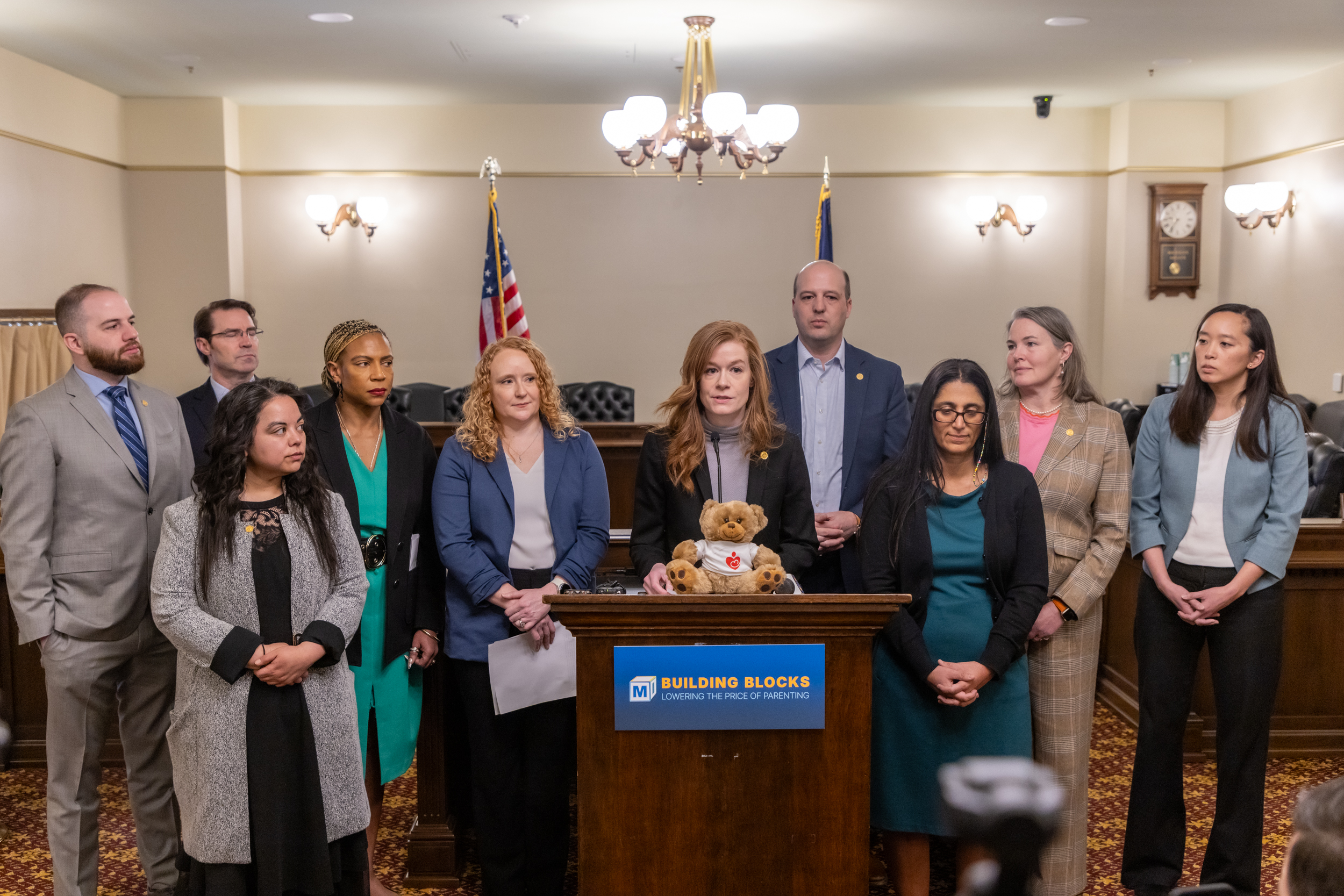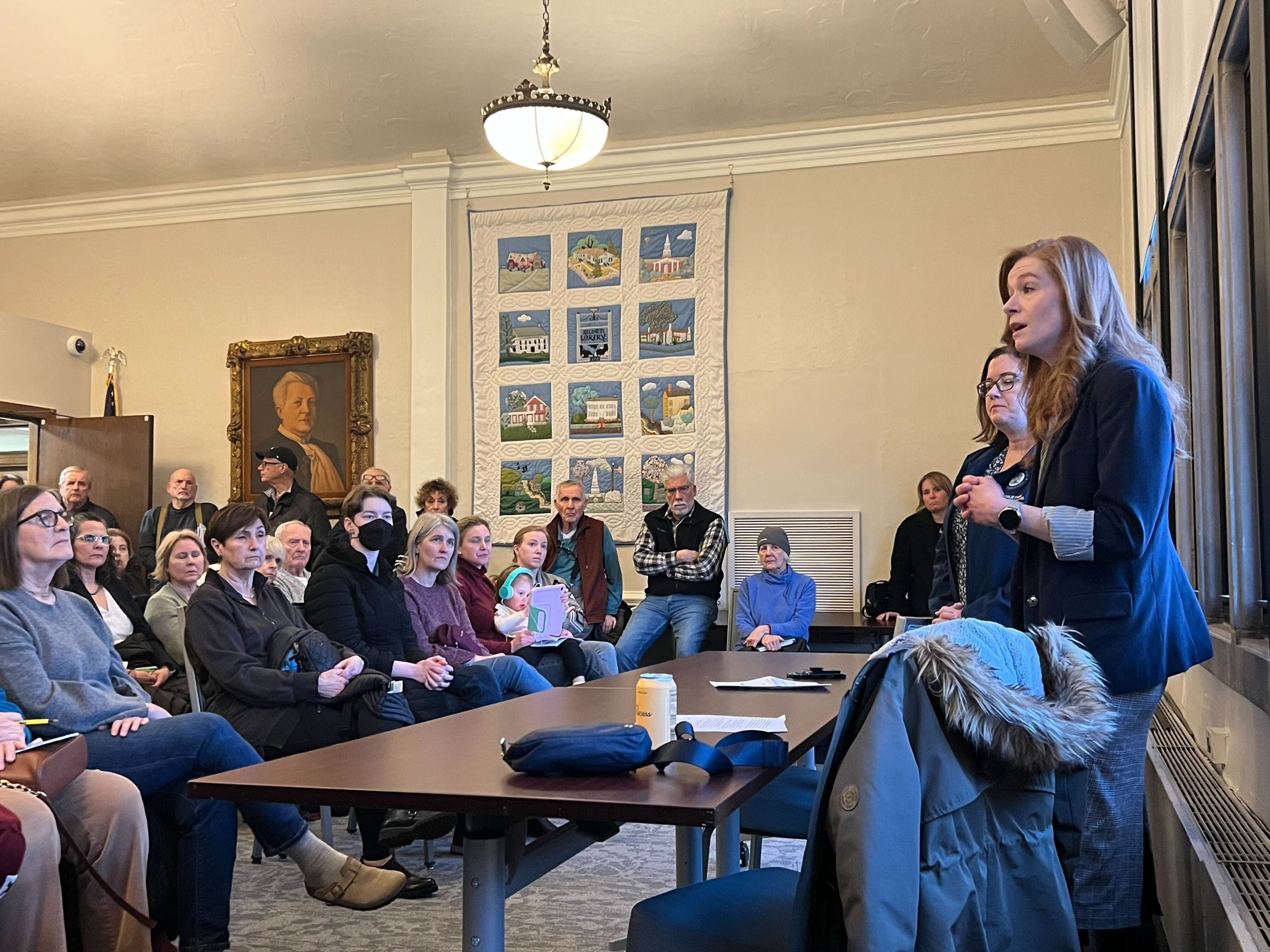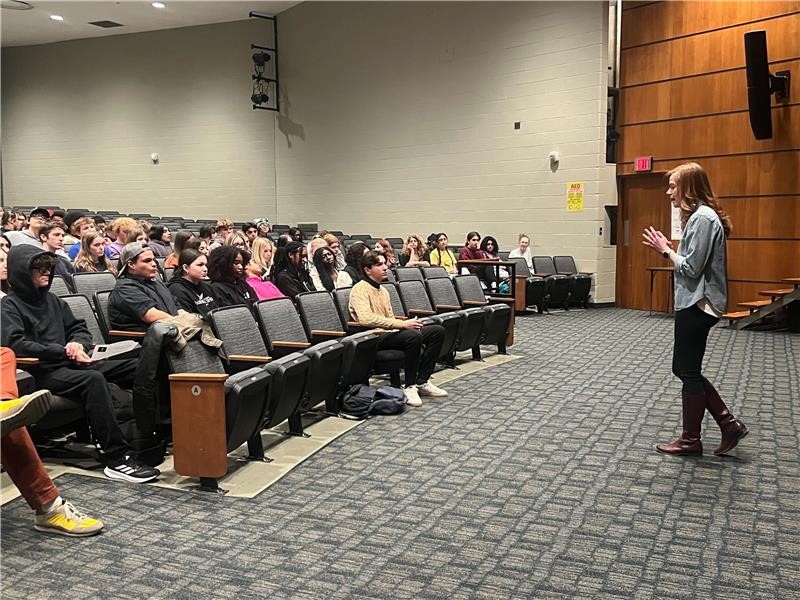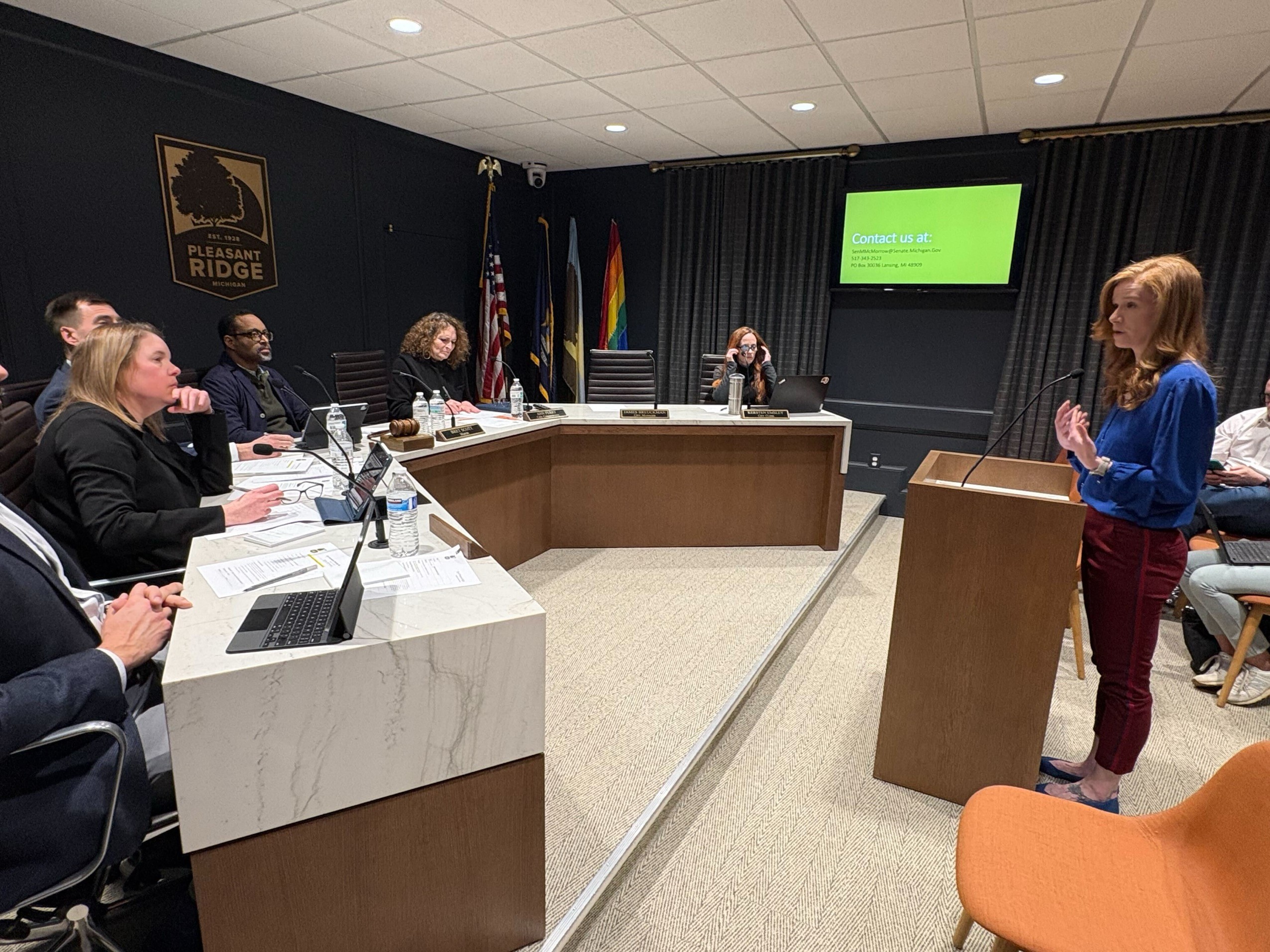

- Legislative Update: Last Wednesday, the Michigan Senate Oversight Committee reviewed the impact of the Trump administration’s federal funding freeze, which has disrupted grants for health care, education, and nonprofits. Although a court temporarily blocked the freeze, uncertainty still remains, with $396 billion in federal funds still on hold.
- Legislative Update: House Speaker Matt Hall has refused to send 9 bills passed by the legislature at the end of the last term to the governor, a move that compelled us in the state senate to take legal action against the Speaker and the House for acting in violation of the Constitution. Two weeks ago, a judge ruled in favor of the Senate, that all bills passed by the Michigan Legislature must be presented to the governor, reinforcing that elected officials must follow the law.
- District Update: The Michigan Dept. of Education, lawmakers and parents celebrate the continued impact of the free school meal program, which saves Michigan families approximately $850 a year on food costs and hours of prep time. The widely popular program has significantly increased the number of kids eating at school, keeping kids fed and focused in the classroom.
- In the Community: Over the past week, I joined State Rep. Natalie Price in Birmingham, and State Rep. Sharon MacDonnell in Clawson for two community conversation events, hearing directly from hundreds of constituents about their concerns and discussing ways to address local issues.
- In the Community: March Is Reading Month! I visited MacDowell Prep in Detroit, where we read The Barnabus Project and Sofia Valdez, Future Prez, and the kids shared their ideas for what they’d add to a park, including water toys and a water park!
- Good News from the District: Wayne State University is raising its income threshold for the Wayne State Guarantee tuition pledge to $80,000, offering free tuition to Michigan students from families earning that amount or less, starting in the 2025-26 school year for incoming freshmen.
- Good News from the District: Einstein Elementary in Oak Park held a successful taste test for a new plant-based lunch program, promoting healthier meals and a greener future for students.

Community and State Groups Discuss Effects of Federal Funding Freeze in Michigan
Earlier this month, the Michigan Senate Oversight Committee held a hearing to examine the impact of the Trump administration’s federal funding freeze. The pause, which was announced in January, has disrupted grants and loans across multiple sectors. Although a federal court has temporarily blocked the freeze following lawsuits from 22 states, including Michigan, the uncertainty remains a real concern. Some of those who testified reported that critical funds have been delayed up to six weeks or more, disrupting payroll, services, and creating a chilling effect for potential hires. During the hearing, leaders from health care, early childhood education, and nonprofit organizations shared how the funding pause has affected their work:
- Health Care: The Michigan Primary Care Association and a Federally Qualified Health Center in Pontiac reported that the freeze threatened critical services, potentially increasing emergency room visits and straining hospitals.
- Early Childhood Education: Head Start programs warned that funding delays could impact thousands of children and disrupt essential services.
- Nonprofits & Disability Support: Leaders in the nonprofit sector highlighted concerns about job stability and service reductions for individuals with disabilities.
The committee also noted that roughly $396 billion in federal funds remains withheld across the country, which is affecting infrastructure, medical research, and other important programs. Given the fact that federal funding makes up an estimated 40% of our state budget, it sounds the alarm for us to find a solution. In case you missed the committee hearing on Wednesday, you can watch it here.
CALL TO ACTION: If you are part of an organization which is directly impacted by cuts or funding freezes at the federal level and are willing to share your story, please contact our office at SenMMcMorrow@Senate.Michigan.gov. Being aware of the real impacts on our community help us better advocate on your behalf, and we may seek your expert testimony in future Oversight hearings with your permission. Any information shared with our office will be kept confidential without your express permission to share.
Michigan Senate Wins Lawsuit, Secures Wins for Teachers, First Responders, & Corrections Officers
Two weeks ago, a Michigan court ruled in favor of Senate Majority Leader Winnie Brinks and the Michigan Senate in Michigan Senate v. Michigan House of Representatives, confirming that the Michigan Constitution requires every bill passed by the Legislature to be presented to the governor. This decision reinforces that all elected officials, including those in legislative leadership, must follow the law.
The lawsuit was brought forth by Leader Brinks after House Speaker Matt Hall failed to present nine bills that passed both chambers to Gov. Gretchen Whitmer. The bills — House Bills 4177, 4665-4667, and 4900-4901 of 2023 and House Bills 5817-5818 and 6058 of 2024 — improve retirement benefits for state corrections and conservation officers as well as lower health care costs for firefighters, teachers, and other public sector employees.
Michigan Senators Unveils Plan to Cut Costs, Improve Child Care, and Expand Opportunities

More than 1.7 million Michigan households struggle to afford necessities, and for parents with young children, it’s even harder. Prices for essentials like diapers, childcare, and housing have increased, making it difficult for families to keep up. Two-thirds of parents report being overwhelmed by financial concerns, and a quarter cannot afford enough food or housing. When families struggle, it affects the entire economy. While we’ve taken steps to help expand the Earned Income Tax Credit, repeal the retirement tax, and ensure kids receive school meals, there is still more work to do.
That’s why I joined my colleagues in the Senate to introduce a plan that would lower costs, support parents, and strengthen Michigan’s workforce. Announced at a press conference earlier this week alongside Sens. Kevin Hertel and Sylvia Santana, our “Building Blocks” plan works to cut the cost of parenting by:
- Providing an income boost to working families through a targeted Working Parents Tax Credit;
- Expand Rx Kids statewide, a first-of-its-kind program that provides cash payments to new mothers and their babies; and
- Tackle the child care crisis from both the demand and supply side, making it more affordable for families and more sustainable for child care professionals.
As the mom of a young daughter, I know what parents are going through, trying to manage everything in the midst of financial uncertainty. I also know that Michigan has always been a place where hard work leads to opportunity. I’m proud that while some elected officials back policies favoring large corporations, my colleagues and I are offering real solutions to the most pressing challenges our families are facing, such as tight budgets, lack of child care, and rising childhood poverty. It’s time to ensure families around the state have the support and resources they need to thrive.
To see the press conference, you can watch it here.
CALL TO ACTION: Become a citizen co-sponsor of our Building Blocks plan, helping us build a Michigan where families — including yours! — have the support and resources they need to set their children up for success. Add your name at the bottom of this page, where we also invite you to share your experience trying to access and afford child care.

Support for Federal Workers in Michigan Impacted by Federal Layoffs and Funding Cuts
The Michigan Dept. of Labor and Economic Opportunity (LEO) has created a webpage to help federal workers who have recently lost their jobs. The new page offers resources for unemployment, job searches, and community support. Workers who have lost their jobs through no fault of their own may be eligible for temporary financial assistance through the Unemployment Insurance Agency (UIA). The UIA offers several resources, including:
- UIA Claimant Roadmap: A six-step guide to applying for and understanding unemployment benefits.
- Online Coaching Sessions: Web-based guidance from UIA staff to assist with applications and payments.
- UIA Community Connect: A program helping underserved workers facing barriers when filing for jobless benefits.
- Schedule an Appointment: Schedule an in-person, phone, or virtual appointment with a UIA Customer Service Agent.
- Looking for Work: Information on job search responsibilities and documentation.
- Assistance with Setting Up an Account: Workers must create a MiLogin account before setting up a MiWAM account.
For additional help, visit Michigan.gov/UIA or call Customer Service at 866-500-0017 to speak with an agent or unlock a MiWAM or MiLogin account.
Celebrating Free School Meals for Michigan Students
In the past two state budgets, my colleagues and I secured funding to provide free breakfast and lunch for all public school students, helping Michigan families save around $850 annually on food costs while ensuring students stay nourished and focused in class.
As one of only eight states which offer a statewide free meal program for all public school students, the Michigan Dept. of Education recognized March 3-7 as National School Breakfast Week, an opportunity to highlight this widely popular and successful program. Since the start of Michigan School Meals in the 2023-24 school year, 31% more students are eating breakfast at school, and 25% more are eating lunch there as well. And the program doesn’t just benefit students and their families but also provides a boost to local farmers and food producers. We’ve also heard overwhelming positive feedback from parents, noting that the program not only saves them money, but time. The proposed 2026 state budget includes funding for free breakfast and lunch for public school students.
Detours for the I-696 Reconstruction Project
As of the morning of March 3rd, eastbound I-696 has closed for the two-year reconstruction project. In lieu of the freeway closure, MDOT has suggested the following detour routes to resume commutes back onto eastbound I-696 in order:
- Southbound Lodge Freeway
- Eastbound Davison Highway
- Northbound I-75
To learn more about detours and other important information about the reconstruction project, you can read here.
What Ontario’s 25% Electricity Tariff Means for Michigan, And What You Should Know
Ontario is imposing a 25% surcharge on electricity exports to the U.S., including Michigan, in response to recent U.S. trade policies and tariffs on Canadian goods. The immediate impact on Michigan is expected to be small, but officials are monitoring potential long-term effects on the power grid.
Here’s what this means for Michigan:
- Little Direct Impact on Consumers: Michigan generates most of its electricity within the state, so residents and businesses are not expected to see higher electricity prices as a direct result of this surcharge.
- Potential Grid Reliability Concerns: Michigan’s power grid is connected to Ontario’s through transmission lines that help balance supply and demand. While the price increase won’t immediately affect consumers, it could discourage electricity transfers between Michigan and Ontario, which might impact grid stability in the future.
Officials are keeping an eye on the situation, but Michigan’s energy supply is stable for now. This shows why it’s important to work with Canada, one of our biggest trading partners, and plan for a reliable power grid. To learn more, you can read here.

Birmingham Coffee Hour with State Rep. Natalie Price

I joined State Rep. Natalie Price for a Community Conversation in Birmingham, where we spoke with constituents about the issues that matter most to them. Attendance far exceeded capacity of the room, with multiple constituents lining the walls, seated on the floor, and overflowing out into the hallway, illustrating the stark fear, anxiety, and heightened concerns many of our residents have, particularly with the news out of the federal government. Three attendees spoke of their positions as federal workers themselves, noting that they anticipated being fired, their programs downsized, or speaking of disruptions within their work and for their families. Other attendees asked about federal funding, the impacts we’re likely to face in our state, and one reverend in attendance highlighted the fear of his parishioners, many of whom are struggling to make ends meet. We encourage everyone to attend future community conversations, ask questions, and share their thoughts. Engaging with your elected representatives is one of the most effective ways to stay informed and be part of the democratic process.
Clawson Coffee Hour with Special Guest State Rep. Sharon MacDonell


It was incredible to see over 200 people come out to our regular district coffee hour with State Rep. Sharon MacDonell at Leon & Lulu in Clawson. (The last time we hosted a coffee hour at this same location, we had about a dozen people!) I made a point to ask how many people in attendance had never attended a state legislator’s event before today, and the majority of hands shot up. That is incredible. People are getting engaged, stepping out of their comfort zones, meeting their neighbors, and learning what they can do at a moment of so much chaos and uncertainty.
We heard so much anxiety, fear, and anger, from Elon Musk slashing the federal workforce with no rhyme or reason, to concerns about Medicaid, Medicare, and risks to local programs that people depend on. One woman shared that her grandson needs a state program to support his epilepsy and worries that without federal funding, he may not have that program — one he needs to survive. Another asked about teachers’ health care costs and how House Speaker Matt Hall could still refuse to send bills to the governor’s desk that would bring those costs down. But so much of the conversation was answering the question: “What can we do?” Here are three suggestions I shared to the group:
- Encourage everyone you know to find out who their elected officials are at every level, including state House and state Senate, and sign up for their official email newsletters. Knowing who represents you and staying informed on their work beyond the chaos in Washington is key.
- Take time to decide what 1-3 issues you care about the most. Right now, the news feels like a firehose and it’s impossible to keep up if you’re trying to respond on every issue. But what really moves you? What impacts you in a personal way? Stay focused on advocacy and contacting your officials on JUST those issues, and you’ll develop real relationships with your officials and be more likely to have a real impact than feeling like you have to call or email on every issue. And it will allow you the energy to sustain your advocacy without getting burned out.
- Share your personal stories. Are you impacted by changes from the federal level? Were you fired by DOGE? Are you worried about a program you need to survive? Are you worried you won’t be able to access care without telehealth appointments? Whatever it is, your stories and how you are impacted as a real person empower us to better advocate on your behalf and humanizes each issue. We don’t know what we don’t know, but you do. It’s so much more powerful than statistics.
Thank you to Leon & Lulu for hosting us and please SHOP SMALL to support our local small businesses.
Reading to MacDowell Preparatory Academy Kindergarteners


March Is Reading Month is well underway, and I visited MacDowell Prep in Detroit. We read The Barnabus Project and Sofia Valdez, Future Prez. Since the character Sofia was cleaning up a landfill to make a park, I also asked about their favorite things that they might add to a park. These kids are ready for warm weather, because in addition to swings and slides, many wanted water toys and a full water park! I absolutely love this part of my job.
Speaking to Royal Oak High School’s Government Class

This week, I spoke with Royal Oak High School’s government class about state government and my role as a state senator. We went over how decisions are made at the state level, the legislative process, and what it’s like to serve the community. I also shared some of the challenges and responsibilities that come with the job. The students asked thoughtful questions and were eager to learn more about how government works and how they can get involved.
Reading to Northwood Elementary School’s 2nd Grade Class

I visited Northwood Elementary in Royal Oak to read to three second-grade classes as part of March is Reading Month. We read Stuck, Going Places, and And Then It’s Spring, and then chatted about the changing seasons, and whether any of the students were able to walk to school. It was great to hear their thoughts and see their enthusiasm for reading. We wrapped up with plenty of high fives and fist bumps!
Pleasant Ridge City Council Meeting

I attended the Pleasant Ridge City Council meeting to share our quarterly update on the 8th Senate District. During the meeting, I discussed key updates, including Michigan’s red flag law ERPO (Extreme Risk Protection Order), a recent court ruling in favor of the Senate in our suit against Speaker Matt Hall to compel the House to send nine outstanding bills to the governor, and details on new legislation pertaining to minimum wage and earned sick time (Senate Bill 8 & House Bill 4002). I also shared budget wins for our district, outlined legislative priorities for the upcoming spring season, and talked about recent events I’ve attended in the district to engage with constituents and hear their concerns.
🍀 Walk With Me! Royal Oak St. Patrick’s Day Parade-Tomorrow 3/15 🍀

Tomorrow, Saturday March 15th is the Royal Oak St. Patrick’s Day Parade. If you would like to walk with Team McMorrow, just meet us at Royal Oak Middle school at 11:00 a.m. The parade starts at 11:45 a.m. I would love to have you join me. Hope to see you there!

School Plant–Based Food Pilot Program

Einstein Elementary in Oak Park had their first taste test of a new plant-based pilot lunch program earlier this week. It looks like the kids loved the options! This initiative helps expand access to healthy meals, promotes better eating habits, and supports a greener future. Thank you to Chartwells for serving these meals for the students.
Wayne State Free Tuition for Families Earning $80,000 or Less Annually

Wayne State University is now offering free tuition to Michigan students whose families earn $80,000 a year or less. The university is raising the previous $70,000 income threshold for the Wayne State Guarantee tuition pledge. The new eligibility threshold takes effect at the beginning of the 2025-26 school year for incoming freshmen. A couple important things to note about this:
- Students must be enrolled full-time (12 or more credit hours per semester) each semester. Funding is for the fall and winter semesters.
- WSU must receive the 2025-26 FAFSA by April 1, 2025 and you must be eligible to receive federal student aid. Apply for admission to WSU by April 1, 2025.
A Strong Run for the Detroit Mercy Women’s Basketball Team in the Quarterfinals

Photo Credit: Jack Moreland – Detroit Mercy Athletics
Congratulations to the Detroit Mercy women’s basketball team for advancing in the Horizon League tournament after defeating Milwaukee 73-62 in the first round! As the Number 6 seed, they faced the Number 3 seed, Cleveland State, in the quarterfinals on March 6th. Unfortunately, they were defeated 92-61, but their strong performance in the tournament was a great effort and a proud moment for the team and our community.

Thank you for staying connected with us through our biweekly e-newsletter. We’re committed to keeping you informed on our work in Lansing and the progress we’re making in our district. Whether it’s legislative updates or community initiatives, we want to ensure you’re engaged and aware of the ways we’re advocating for you.
Reach out with any questions, concerns, or ideas that you may have. Our office is here to assist you with any state-related matters, and we value your feedback. Feel free to contact us at (517) 373-2523 or by email at SenMMcMorrow@senate.michigan.gov.
